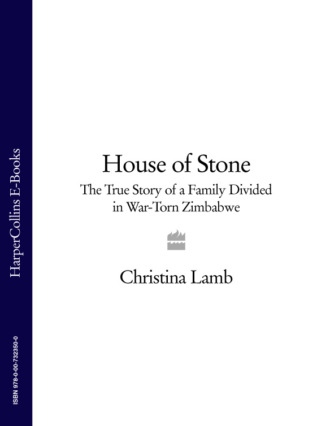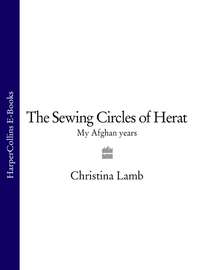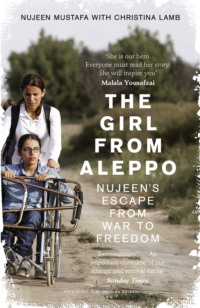
Полная версия
House of Stone: The True Story of a Family Divided in War-Torn Zimbabwe
Their home was a small compound comprising three rondavels, round windowless huts, inside a fence of jagged branches. Like all the huts in the village, theirs were made from mud from anthills that the women would mix up with water from the river to form sticky dough then plaster it on with their hands. I loved watching them doing it and longed for the day I would have my own hut. Some of the more artistic women used sticks to decorate them with swirls or a sharp stone to cut a diamond pattern, but her mother left theirs plain. The roof was made of dried elephant grass that the women carried on their heads in bundles from the river, and for the floor they mixed cowpats with water, which set as solid as concrete.
The biggest hut in their compound was the bedroom hut where her mother, father and surviving baby brother slept and their few belongings were kept. The only decor was a small cracked mirror and a yellowing 1966 calendar advertising tractor parts that her father had brought back from a job; there was a thin lumpy mattress on the ground and a tin trunk held clothes and a Bible.
The second hut was on stilts with a ladder of crooked logs leading up to it. That was the storeroom for mealie meal to dry, safe from the white ants that got everywhere and the rats that kept Aqui awake with their scrabbling at night as they tried to tunnel under the hut walls. The third and last hut was the kitchen hut in which they cooked the meals and Aqui and her sisters would sleep. The kitchen hut also served as the sitting room and as the female members of the family entered they would squat on the ground on the left while the men veered right to sit on a raised bench that ran all along the side. It was always smoky inside, but once a visitor grew accustomed to the gloom they would see shelves at the back moulded from the wall. On these were arranged the family's few cooking utensils and tin cups as well as two green enamel plates decorated with red flowers that her father had brought from town. The back of the hut was considered the sacred abode of the mudzimu, the ancestral spirits that protect the family, and when Aqui's siblings died they were laid on one of the shelves before being buried to help them cross the boundary to the spirit world.
In the centre of the floor was a fire in a round hearth where her mother would cook sadza. Sometimes they would eat it spiced up with relish from her mother's garden or wild fruits like marula or chakata that the chief had forbidden the villagers from selling because he believed that would cause lightning.
If the mealies were ready in the field they would roast them brown and crispy, and this was Aqui's favourite food. She thought there was nothing better than blowing off the ash and biting into the crunchy sweetness. Apart, perhaps, from the first rain when the children would all run outside and dance about, holding their hands out to try and catch the little liquid rocks which burst all around them and would turn the brown land green overnight and wash away the red dust that coated their feet and shins. In winter the cooking meant the hut would be nice and cosy to sleep in but in summer it was like an oven and horrid.
The happiest days were those when she arrived home to a yeasty smell in the air and a large oil-drum bubbling away on a fire. This would mean her mother was making Seven Days, a homemade beer of maize and rapoko millet mixed with well water, so named because it took seven days to be ready. It was this that paid for Aqui's school fees and the uniform of blue and white striped dress that she always kept immaculate.
Her mother's beer was renowned in the village. On the first day of brewing, beer drinkers would pass by and give a long sniff then say, ‘Eh, eh, that smells good, I am looking forward to drinking this one.’ After a day of simmering, the drum would be left to cool in the hut for two days and on the fourth day more rapoko added until the mixture was of porridge consistency. It was then repeatedly boiled and simmered to reduce it and more water added from the well. When the beer was ready it had a thick froth which had to be poured off through a sieve.
On the seventh day if the beer drinkers did not automatically return to the hut, Aqui would climb an anthill or rock and shout, ‘Seven Day is ready!’ Her mother would then sit by the big drum, her wide skirt arranged around her considerable girth, and ladle out the lumpy yellow liquid with a cup hooked to a long stick. She usually told me to give the first cup to the biggest beer-drinker because if he pronounced it good then others would flock in. People gave ten cents a cup if they had money, otherwise they paid in kind with cobs of corn or cabbage heads, and would sit there from morning till night, talking, drinking, playing tsoro [a kind of backgammon with bottle-tops] and fighting. The customers were almost all men but there was one married couple who would arrive early in the morning holding hands nicely, and, by the evening, be fighting like dogs.
Aqui hated fighting. Her full name Aquinata meant peacemaker and she was the family's firstborn in a land where everyone wanted a son. She also had a Shona name-Wadzanai-which her mother said meant ‘Don't shout at each other’. It was only later that Aqui would ponder the circumstances that on the long night of her birth in August 1962 had led to her parents choosing such a name rather than Precious, Blessing or Joy like her friends, or Chipo, which means Gift, like her mother.
Aquinata was the name she was christened by the Irish missionary with the shaky hands who downed her in the bowl of water and let slip. It was a story she never tired of hearing from her mother. She particularly liked the bit where for a moment there was complete silence in the room that served as a church and the congregation all held their breath wide-eyed. Her mother usually paused in the telling at that point. Then baby Aqui was retrieved and borne aloft dripping, and to everyone's astonishment she did not cry. Father Walter said she was named after a saint who was a man of peace and renounced all things. She did not really have anything to renounce, apart from her school uniform, but she liked having a distinguished name even if everyone in the village shortened it to Aqui, pronounced ack-we.
On days that Aqui had not been kept at school late to cook, when she got home, she would go to their stand or field and tend the cattle and goats. This meant swatting away the clouds of flies that hovered over their hides and picking the ticks from their skin as the animals pulled and chewed at the grass, then herding them back to their compound before the first stars lit in the sky. Her mhondoro grandmother was so wealthy from selling clay pots that she owned six cows that Aqui was sometimes allowed to milk. She loved to drink the thick yellow cream off the top.
The thing I really didn't like was ploughing. As the eldest I was expected to learn hut the mombes [cows] never stopped moving and would always pull away as I tried to yoke them to the plough. The task she dreaded most of all was trying to attach the scotch-cart. This was a trailer fashioned from planks of wood set on an axle and two wheels purloined from a car that had crashed on the road. We used the scotch-cart to collect the crops after they had been reaped and placed in lots of heaps, ready to take to the village store. I was small and the log to join the cart had to be held high up while all the time the cows would be moving.
She knew they were lucky to have cows and not just a small hoe to plough with manually like many of the villagers, but the mombes were obdurate creatures and she hated the boys laughing at her as she tried over and over again to yoke them. All the villages ploughed down the hills rather than across like the white man because it was easier. No land was ever left fallow as it was all needed for the cattle and growing maize, particularly in those years when the maize grew no higher than her waist.
She had never been to Chivhu where the whites had their farms but she had heard villagers say that the fields there had special machines for spraying water for times when the rains did not come, and long golden corn, not at all like the stunted brown stalks that grew in their fields and often withered away. They told of cows fatter than huts and chickens that laid giant eggs. My father said that the hones of our ancestors and cattle were under those fields and one day we would get them hack from the whites.
Land had not been the main aim of the first white settlers when they left Cape Town for Mafeking in April 1890 to gather in a long line of ox-wagons behind a Union Jack and head off across the Limpopo or Crocodile River for Mashonaland. Stories of hills of gold, even more dazzling than the Rand, the great gold ridge of Johannesburg then making many fortunes, had spread through the Cape Colony and Europe. It was known that there had been gold mines in Mashonaland in the time of the kings of Mono-matapa, the African rulers who had traded with the Portuguese who settled on the Mozambique coast in the sixteenth and seventeenth centuries. But the kingdom had mysteriously collapsed, leaving nothing but the ruins of a vast granite fortress at Great Zimbabwe. Rumours abounded that Mashonaland was the site of King Solomon's mines or the fabled land of Ophir referred to in the Bible, and the 200 members of Cecil Rhodes's Pioneer Column had each been promised fifteen gold claims.
Mashonaland was located on the Great Central African plateau between two mighty rivers, the Limpopo to the south and the Zambezi to the north. It was next to Matabeleland, which was ruled over by Lobengula, King of the Ndebele, whose father Mzilikazi had led his people north to escape the spears of Shaka Zulu and the guns of the Boers. Almost as warlike as their Zulu cousins, the Ndebele considered the Mashona their subjects and sent frequent raiding parties to steal their cows.
Aqui, like all Mashona children, knew that Lobengula had been tricked by Rhodes into granting British rights for mining and colonization of these lands. Rhodes was already fabulously wealthy from his control of the diamond mining industry in Kimberley and gold mines in Johannesburg but believed that even greater riches lay further north. He also dreamed of one day extending Anglo-Saxon control to all the land from the Cape to Cairo. He saw that Bismarck's Germany and the Portuguese throne which controlled territory to the west and east were already casting covetous eyes the same way, as were the Boers to the south. So, in 1888, he sent three emissaries led by Charles Rudd to King Lobengula's kraal in Matabeleland to request a monopoly on prospecting rights.
The Ndebele king must have presented a bizarre sight. Six feet tall and weighing perhaps twenty stone, he was naked apart from a modest loincloth and spread his massive bulk on a throne made of packing cases for condensed milk tins. On the wall hung a painting of Queen Victoria of whom he was a great admirer. But the name of his kraal was Gu-Bulawayo, which meant ‘Place of slaughter’, and behind its high palisade of wood he maintained one of the most powerful armies of any African kingdom.
Lobengula was illiterate but highly intelligent and wavered over Rudd's request. He was finally persuaded by the arrival of Rhodes's special emissary, Dr Leander Starr Jameson, who had alleviated the king's gout with morphine injections. Encouraged by Dr Jim, as he was known, Lobengula put his mark to the so-called Rudd Concession in return for a pension of £100 a month, 10,000 rifles, 100,000 rounds of ammunition and a gunboat on the Zambezi. Similar deals were made with chiefs further north in what would become Zambia and Malawi.
The king later claimed the document had been deliberately mistranslated. The missionary who read it to him had assured him that the British would not bring more than ten white men and ‘would abide by his laws and be as his people’. Even so the story made Aqui angry. Lobengula was given sugar and he gave away the country-they have that weakness, the Ndebele. Lobengula sent two envoys to London with a letter of protest to Queen Victoria, all to no avail. Despite the method by which the concession was obtained, Rhodes was granted a royal charter to make treaties, promulgate laws, establish a police force, and award land throughout Mashonaland and Matabeleland, an area of 175,000 square miles-about three times the size of England.
Initially known as Zambezia, the name was changed to Rhodesia in his honour, while the land north of the Zambezi became Northern Rhodesia. In the picture in our schoolbook he looked like a very small man to have two whole countries named after him. I couldn't think of anyone else who did, even the Queen of Britain who we used to sing asking God to save every morning. I thought she must have done something very bad to need so many children so far away asking God to save her.
With the charter granted, the Pioneers had set off on horseback or in their covered wagons through the British Protectorate of Bechuanaland, skirting the edge of Matabeleland with its Ndebele warriors, toward the unknown land of the msasa tree. Their guide was the big game hunter Frederick Selous whose bestseller A Hunter's Wanderings in Africa had made him a hero in Britain. To protect them they had been assigned 300 paramilitary police from Rhodes's new British South Africa or Charter Company who were armed with Martini-Henry rifles and a steam-powered naval searchlight that would sweep the plains at night.
It was hard work hacking their way through the wilderness even though they had taken hundreds of African labourers to cut and dig. The dryness of the season meant the column spent much of its time enveloped in a huge dust cloud and their boots ‘rotted like paper’. Several Pioneers fell sick and died, keeping the Jesuit priests who had accompanied them busy with funerals. Many oxen succumbed to tsetse fly and almost 100 horses died of horse sickness while several wagons of supplies had been washed away in crocodile-infested rivers or jammed on stony stream-beds. Their perilous journey would inspire Rudyard Kipling to write in ‘The Elephant's Child’, one of his Just So Stories, of the ‘great grey-green greasy Limpopo all set about with fever trees’.
The natives laughed at these strange arrivals in their unsuitable thick clothes even though the ngangas were warning of bad times ahead. The white men were undeterred and pitched their canvas tents in Masvingo, which they renamed Fort Victoria after their Queen. From there they rode off to see Great Zimbabwe and were astonished by its soaring walls made of ‘even shaped blocks of granite fitted so closely that a blade of a knife could not be inserted’. Although it was overgrown they saw ‘enough to realise that their extent and importance had not been overstated’, and excitement mounted.
They continued north, past Chivhu or Enkeldoorn, up to a marshy spot they named Fort Salisbury, after the Prime Minister. A 21-gun salute boomed out over the plains as on 13 September 1890, five months after setting off, they hoisted the Union Jack on a hill called Harare after a local chief.
A year later their women started arriving, first nuns and ladies of the night, a strange vision in all their petticoats, then wives. There were gold rushes all over the land, including in the hills around Chivhu, but instead of the imagined quartz reefs studded with lumps of gold they found malaria and famine. So they turned to the next available prize-land.
Each settler was awarded 3,000 acres for just sixpence-the price of a British South Africa Company revenue stamp-and farms were pegged out regardless of whether there were people living there. The Jesuits were rewarded for their services with 12,000 acres for a mission station. Soon the whites had taken the best land on the Mashonaland plateau, chasing away the area's previous inhabitants, stealing their cattle and forcing them to flee to stony ground. When you went there you couldn't think you were going to visit a person but a baboon climbing in all those mountains and bush. To pay the hut tax of ten shillings a year that the whites charged them, many of the men had to go and work in the mines in South Africa or the farms of the settlers.
Aqui's father said their own people were fortunate to have been granted communal land which might not have been grassy like that of the whites in Chivhu, and was away from the places with rain, but at least some things grew, when there was no locust or drought. He said they were lucky too not to have been moved again after the Big Wars in Europe when new whites came and land had to be found for them, given commemorative names like Victory Block. More than 400,000 people, almost a third of the black population, were evicted from their villages between 1945 and 1955. Nothing but mounds of red mud remained of their huts and homes.
Hut tax had been replaced by cattle tax, which was supposed to pay for dipping the cows against tick fever. But to Aqui it seemed that the land was running out. In the old days when a man got married he would go to the headman and ask for a stand for himself hut now all the land was already allocated so as sons married they were having to divide up their parents' land. It didn't seem fair to me that it was the women who did all the work hut only the men who got given land. My brother would get land but not me.
The headman of Zhakata's Kraal had a bicycle and late one afternoon he came cycling back, a black Homburg on his head and his withered knees pedalling furiously, carrying a large cream and red Bakelite box with a big dial and lots of knobs. Her father explained it was a radio. Everyone gathered round to listen. They tried to shoo us children away but I crept near. Through the crackle she heard a voice come out of the box to slowly announce: ‘This is the News from the Rhodesian Broadcasting Corporation’, and she jumped as if there were a frog in her pants.
It was from this magic box that in 1969, when she was seven, they heard the nasal voice of the Prime Minister Ian Douglas Smith announce the Land Tenure Act so that the division of land-good to the whites and bad to the blacks-would be fixed for all time. God bless you all, he ended and the elders snorted. Aqui knew from listening to the Seven Day drinkers that Ian Smith was a Bad Man and what he said meant there would never be land for her and her children, not in a thousand years, but there were some people fighting against this. Pamphlets sometimes appeared in the nearby township with names like Ndabaningi Sithole, Robert Mugabe and Joshua Nkomo, nationalist leaders who had been in jail since 1963. They were always quickly burnt.
Mostly though we were all too busy with the small things of life to think about these matters. Apart from all the work in the fields, we had to go to collect firewood and water at the well. The elders had built a protection of logs around to stop cows defecating in it but sometimes it was a brownish colour.
Every morning the women and girls went to the well, which was forty-five minutes' walk away. To Aqui, trying hard not to splash any precious water, they looked like ghostly figures walking through the mists balancing clay jars on their heads, every so often a hand fluttering upwards to support the weight. In the summer they went again in the evening, but not in the winter when the nights were too dark to wash the cooking pots because they could not see if there were any snakes lurking inside. We village children would all gather after supper. The moon was our electricity, and we would play games like Hide and Seek, Spot Spot or Hwaai hwaai which meant ‘Sheep, sheep, come here’. That was my favourite where we took turns being sheep and someone was the hyena and had to try and catch us.
Twice a week the choirmaster blew his whistle, the signal for those in the choir to meet under the forked tree. People said Aqui had a honey-sweet voice and she loved singing in the choir, the bare hills echoing the music. Sometimes there were competitions against other villages and once their choir won a cup, but only as runner-up. Everyone knew this was because of the choirmaster's wife who sang like a dog whose tail had been stepped on.
Another kind of singing was often to be heard in the village and that was from members of the Apostolic Church of Africa, which would later become the Zion Church with clothes and capes like nurses' uniforms and coloured ribbons on brass pins. Dressed in white robes they would dance about to a drummer faster and faster until one of them started speaking in tongues and frothing at the mouth as if possessed by a spirit. Their eyes would roll back so only the whites were visible. Aqui didn't like them at all. I thought they were scary.
Aqui was proud of being a Catholic praying in a proper church or at least a hall with a painted white cross outside. People would say you can't take that path because of the tokolosh or the bus broke down because of the tokolosh but I never thoughtI'd get possessed. They would warn you can't say that or the dead will be unhappy but I didn't believe in spirits. If I said that, though, they would laugh at me and say, ‘You think you're a murungu,’ a white person. I'd reply, ‘I'm not a fool,’ and they would point their fingers menacingly and say, ‘One day you'll see.’
One day she came home from school to hear wailing so agonized as to rival the hyenas in the hills. It was Priscilla, one of the white-robed Apostolics who always had her nose pointed towards the sky because her husband Lovemore had a full-time job on a tobacco farm and sent back regular money. She had used this to buy a sewing machine from which she made children's clothes from scraps of material. She had no children herself, though-Aqui once heard her father say, ‘That woman is as dry and barren as the earth after two seasons of drought.’
Priscilla's husband worked as a night watchman in the tobacco barn and his duty was to keep the fires burning so that the tobacco dried at the correct temperature. But Lovemore was always falling asleep at his post, and one day the baas had come in and found him snoozing. It was not the first occasion and usually the farmer would cuff him awake. Once he had spray-painted Lovemore's hair completely white to make him the laughing stock of all the workers. This time, though, the farmer was in an angry temper, perhaps because the crop was poor or his wife was becoming bitter-tongued, and he threw Priscilla's husband on the fire and left him to burn.
Now he was the late Lovemore and Priscilla was distraught. ‘Not even a body to bury,’ she sobbed. ‘How will his spirit settle?’ The wag-wags in the village said that not only had she lost her monthly stipend but no one else would marry her, because they all knew no seed would ripen in her womb.
Aqui's mother was always scolding her daughter for her vivid imagination which kept her awake with thoughts of the unformed souls of the dead children escaping the riverbanks, or remembering the day the locust cloud came and turned day into night. She had cowered in the hut fearing something terrible while the other children ran to pick the insects off the thorn trees to fry for supper. The burning of Lovemore gave Aqui something new to think about.
Whites didn't often venture into Native Reserves. The only white people I had ever seen were Father Walter, the Irish missionary at the churchy and the white policeman. It was very important in those days for a white person to talk to you, you would be so happy, but most of them didn't. When they did they spoke loudly as if we were many miles away.
All I knew was that our skins were different and that being white somehow gave you a special power and my grandfather didn't like them. He was very cheeky and refused to pay tax on his cattle, and when the black policemen came on a motorbike to collect it he told them off for doing the dirty work of whites and took out his shambok to chase them away. Although Aqui knew that the nuns at school said it was wrong to hate, they also said they were all God's creatures and she didn't understand why having a white skin should make them different. She thought about Priscilla's husband toasting on the fire and how his skin would have crackled and burnt like the mealie cobs, and began to hate them.






